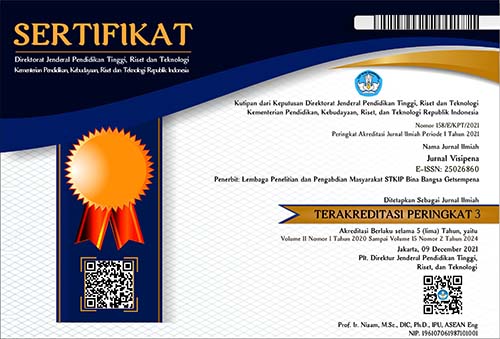PRE-SERVICE TEACHERS’ POWER DOMINANCE AND INTERACTION STRATEGIES IN EFL CLASSROOM DISCOURSE
Abstract
Classroom discourse is literally meant as the language and interaction employed by the teacher and the students to conceptualize learning in the educational context. Classroom discourse is a part of text analysis which is concerned with classroom talk. The current study is closely related to critical discourse analysis (CDA) to investigate power dominancy as well as classroom interaction strategies in the teacher-student talk. The data collected were analyzed based on the language meta-functions using SFL underlining multimodal discourse analysis. The findings reveal that the result of the study revealed that teachers utilized the imperative form to impose authority the majority of the time. This is likely due to the fact that students did not freely participate in all of the activities. They were calling on students' names in order to determine who would talk or answer questions the most of the time. the majority of the questions that the pre-service teachers posed were display questions. The majority of the students responded with brief statements rather than follow-up responses that were longer. the pre-service teachers employ a monologic discourse pattern in their seminars, despite the fact that they assert that they choose a dialogic one to use instead. It's possible that this is due to cultural scripts and the importance placed on the role of the teacher in the educational system. The findings of the study could be helpful to practitioners in the field in terms of employing suitable speech within the framework of EFL, which might facilitate students' participation and engagement in class interactions..
Abstrak
Wacana kelas secara harfiah berarti bahasa dan interaksi yang digunakan oleh guru dan siswa untuk membuat konsep pembelajaran dalam konteks pendidikan. Wacana kelas adalah bagian dari analisis teks yang berkaitan dengan pembicaraan di kelas. Studi saat ini terkait erat dengan analisis wacana kritis (CDA) untuk menyelidiki dominasi kekuasaan serta strategi interaksi kelas dalam pembicaraan guru-siswa. Data yang terkumpul dianalisis berdasarkan metafungsi bahasa menggunakan SFL menggarisbawahi analisis wacana multimodal. Temuan mengungkapkan bahwa hasil penelitian mengungkapkan bahwa guru sering menggunakan bentuk imperatif untuk memaksakan otoritas. Hal ini kemungkinan disebabkan oleh fakta bahwa siswa tidak secara bebas berpartisipasi dalam semua kegiatan. Mereka memanggil nama siswa untuk menentukan siapa yang paling sering berbicara atau menjawab pertanyaan. sebagian besar pertanyaan yang diajukan oleh calon guru adalah pertanyaan pajangan. Mayoritas siswa menanggapi dengan pernyataan singkat daripada tindak lanjut tanggapan yang lebih lama. guru pra-jabatan menggunakan pola wacana monologis dalam seminar mereka, terlepas dari fakta bahwa mereka menegaskan bahwa mereka memilih yang dialogis untuk digunakan. Hal ini mungkin karena naskah budaya dan pentingnya peran guru dalam sistem pendidikan. Temuan penelitian ini dapat membantu para praktisi di lapangan dalam hal menggunakan ucapan yang sesuai dalam kerangka EFL, yang dapat memfasilitasi partisipasi dan keterlibatan siswa dalam interaksi kelas.
Downloads
References
Barekat, B., & Saeedeh, M. (2014). The contribution of the teachers' use of dialogic discourse pattern to the improvement of the students' speaking ability. Procedia, 98, 353 –362. https://doi.org/10.1016/j.sbspro.2014.03.426
Chalak, A. (2019). Classroom discourse and Interaction features of Iranian EFL teachers [Paper presentation]. Fifth International Conference on Language, Discourse, and Pragmatics (LDP), Ahvaz, Iran.
De Los Heros, S. (2009). Linguistic Pluralism or Prescriptivism? A CDA of Language Ideologies in Talento, Peru’s Official Textbook for the First-Year of High School. Linguistics and Education, 20, 172–199,doi:10.1016/j.linged.2009.01.007
Ellis, R. (1994). The study of second language acquisition. Oxford University Press.
Fairclough, N. (2001). Critical Discourse Analysis as a Method in Social Scientific Research. In Methods of Critical Discourse Analysis, edited by R. Wodak and M. Meyer, 121–138.London: Sage.
Halliday, M. A. K. (1978). Language as Social Semiotic: The Social Interpretation of Language and Meaning. London: Edward Arnold
Ingram, J., & Elliott, V. (2019). Research methods for classroom discourse. Bloomsbury
Jenks, C. J. (2021). Researching classroom discourse. Routledge.
Khany, R, & Mohammadi, S. (2016). An analysis of the English class discourse in the Iranian high schools. The Qualitative Report, 21(10), 1817 -1835.
Kress, G., and T. van Leeuwen. (2006). Reading Images: The Grammar of Visual Design. 2nd ed.New York: Routledge
Liu, J. & Le, T. (2012). A case study on college English classroom discourse. International Journal of Innovative Interdisciplinary Research, 2, 1–10.
O'Keeffe, A. C. (2011). Introducing pragmatics in use. Routledge
Richards, Jack C. (2006). Communicative Language Teaching Today. Cambridge: University Press
Richards, Jack C. (2011). Competence and Performance in Language Teaching. Cambridge: Cambridge University Press
Widodo, H. P. (2018). A Critical Micro-Semiotic Analysis of Values Depicted in the Indonesian Ministry of National Education-Endorsed Secondary School English Textbook. In Situating Moral and Cultural Values in ELT Materials: The Southeast Asian Context, edited by H. P.Widodo, L. V. Canh, M. R. G. Perfecto, and A. Buripakdi, 131–152. Cham, Switzerland: Springer
Wodak, R. 2001. What CDA Is About- a Summary of Its History, Important Concepts and Its Development.In Methods of Critical Discourse Analysis, edited by R. Wodak and M. Meyer, 1–13.London: Sage
Xiongyong, C., Samuel, M., Hua, C. (2012). Evaluation of EFL Teachers’ Roles from The Perspective of Mediation: Case Studies of China’s Secondary School Classroom Practices. International Reviews of Social Sciences and Humanities. 3 (1), 118-134.





















